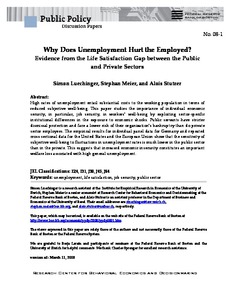Why does unemployment hurt the employed? Evidence from the life satisfaction gap between the public and private sectors
"High rates of unemployment entail substantial costs to the working population in terms of reduced subjective well-being. This paper studies the importance of individual economic security, in particular, job security, in workers' well-being by exploiting sector-specific institutional diffe...
| Main Authors: | , , , |
|---|---|
| Institution: | ETUI-European Trade Union Institute |
| Format: | TEXT |
| Language: | English |
| Published: |
Boston, MA
2008
Federal Reserve Bank of Boston |
| Subjects: | |
| Online Access: | https://www.labourline.org/KENTIKA-19189268124919074409-Why-does-unemployment-hurt-the.htm |
| Summary: | "High rates of unemployment entail substantial costs to the working population in terms of reduced subjective well-being. This paper studies the importance of individual economic security, in particular, job security, in workers' well-being by exploiting sector-specific institutional differences in the exposure to economic shocks. Public servants have stricter dismissal protection and face a lower risk of their organization's bankruptcy than do private sector employees. The empirical results for individual panel data for Germany and repeated cross-sectional data for the United States and the European Union show that the sensitivity of subjective well-being to fluctuations in unemployment rates is much lower in the public sector than in the private. This suggests that increased economic insecurity constitutes an important welfare loss associated with high general unemployment." |
|---|---|
| Physical Description: | 37 p. Digital |

